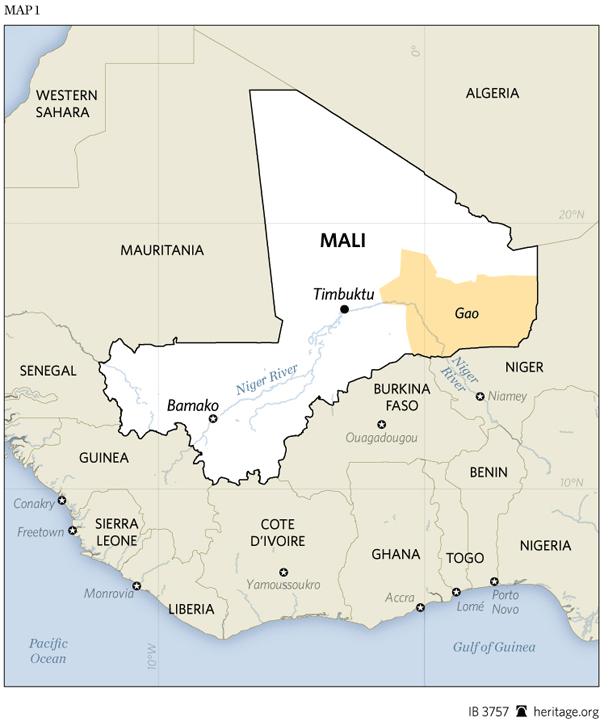The eruption of the “Arab Spring” nearly two years ago created a number of unintended consequences for the region. As the proliferation of terrorist activity rippled across North Africa and into Africa’s Sahel region, it manifested itself in northern Mali.
As Mali struggles to regain its occupied territory, the priority of interim leaders should be the stabilization of the central government rather than combating the northern insurgency.
Unintended Consequence of the “Arab Spring”
In the months prior to the death of Libyan dictator Muammar Qadhafi, Mali experienced an increase in turmoil from its northern Tuareg population. Since the 1960s, Tuareg tribesmen have demanded the independence of a northern territory they call “Azawad,” resulting in periodic rebellions.

Following the fall of the Qadhafi regime, well-armed Tuareg fighters, once loyal to the regime, returned to northern Mali from Libya. By October 2011, an estimated 3,000 armed men with 600 all-terrain vehicles amassed in the Azawad region and joined the ranks of the separatist National Movement for the Liberation of Azawad (MNLA).[1]
The poorly equipped Malian military, charged with suppressing the rebellion, suffered significant losses at the hands of the MNLA despite requesting additional resources from the central government in Bamako. Such events, compiled with pre-existing frustrations, triggered a military coup in March 2012 led by low-ranking officer Captain Amadou Haya Sanogo.
The collapse of President Ammadou Toumani Touré’s democratically elected government quickly created the very situation that the Malian military had attempted to prevent. By April, the secular MNLA aligned itself with the Islamist militant group Ansar Dine (“Defenders of the Faith”) and declared their captured territory, “Azawad,” to be an independent state.
With the two groups unable to reconcile their differences (ideological and otherwise), Ansar Dine quickly sidelined the MNLA and is currently operating alongside al-Qaeda in the Islamic Maghreb (AQIM) and its offshoot, the Movement for Oneness and Jihad in West Africa. Other groups, such as the Nigerian extremist group Boko Haram, are reportedly operating in the region as well.
Together, these groups have enforced Sharia law across northern Mali. Brutal punishments—including public floggings, amputations, and stonings—have taken place, and in July, some of the Sahel’s most prized cultural sites in the administrative region of Timbuktu were ransacked for their adherence to Sufi tradition.
Additionally, humanitarian conditions are declining. Approximately 4.5 million people are suffering from food shortages, and nearly half a million people have been displaced from their homes in the wake of the instability.
Meanwhile, in Bamako, governance has yet to be restored. After President Touré left for exile, the Economic Community of West African States (ECOWAS), the continent’s sub-regional group, denounced the military coup, closed borders, imposed sanctions, and pressured the coup’s leaders to establish a transitional government. Reluctantly, the junta transferred power to Speaker of the National Assembly Dioncounda Traoré.
However, upon coming to power, the interim government was unable to restore order. Public anger with Mali’s ruling elites quickly escalated, and a mob attacked and injured Traoré outside of his residence. Traoré was flown to France for treatment and did not return to Bamako until the end of July. Furthermore, despite being sent back to their barracks, the military continues to hinder progress by attempting to insert itself into government.
The Wrong Response by the International Community
Following Touré’s ouster, ECOWAS proposed military action to prevent northern Mali from becoming a safe haven for terrorism. Last Friday, the United Nations Security Council unanimously approved a resolution providing military and security planners to assist ECOWAS and the African Union in drafting a plan for military intervention in coordination with Mali’s transitional government.
The resolution further states that in 45 days, these plans will be submitted to the Security Council for consideration. For a military intervention to take place, an additional resolution must be passed.
Other international actors that are not members of ECOWAS also wield considerable influence. France took the lead in introducing the recent Security Council resolution, and President Francois Hollande was one of the first to support military intervention. Hollande, however, stopped short of committing French troops to the operation, offering training and logistical support instead.
In contrast, Algeria, Mali’s northern neighbor and the region’s leading military force, opposes any intervention that could jeopardize its border security. Favoring a political solution, Algeria supports the use of dialogue with extremist entities. Considering that AQIM is based in southern Algeria, any military intervention in northern Mali could exacerbate already poor security conditions.
Government Restoration a Priority
The Obama Administration has stated that before any military intervention can take place, there must be an established government in Bamako. However, the Administration has spoken favorably of deploying a peacekeeping force in Mali, similar to the African Union Peacekeeping Mission in Somalia—that is, the use of African troops to fight regional terrorism with the financial backing of the United States. While this model has met some success in reducing al-Shabaab’s influence in Somalia, the lack of a functioning Somali government has prevented the establishment of long-term stability.
Mali’s interim leaders are no substitute for a unified and democratically elected government. Therefore, any troop deployment would be premature. Considering that the current interim government is unable to maintain order in the capital city, there is little reason to believe that once the insurgents are defeated by a military intervention, the government would be able to hold the recaptured territory.
What the Administration Should Do
As the international community edges closer to a military incursion, the Obama Administration should take the following steps:
- Shift the international discussion away from military planning and toward the creation of a viable road map for the reinstatement of a unified government in Bamako.
- Make the restoration of military and intelligence assistance contingent on the military’s demonstrated support of a civilian-led government. The complete restoration of bilateral aid should be contingent on free and fair presidential elections. Humanitarian assistance should be an exception owing to dire food shortages in the north.
- Offer Mali’s interim government consultants, election observers, and other resources to assist in holding credible elections.
- Identify and open dialogue with leading Tuareg separatists who disavow terrorism and seek peace and stability in the north. The Tuareg community has long been marginalized by the government in Bamako and could be a useful ally if certain conditions are met.
Stability First
The occupation of northern Mali and the fall of the central government create a security vacuum that assists terrorists and their affiliates in establishing safe havens. While it is imperative that the north be reclaimed, the restoration of the central government is required for long-term success and should be made a priority.
—Morgan Lorraine Roach is a Research Associate in the Douglas and Sarah Allison Center for Foreign Policy Studies, a division of the Kathryn and Shelby Cullom Davis Institute for International Studies, at The Heritage Foundation.



